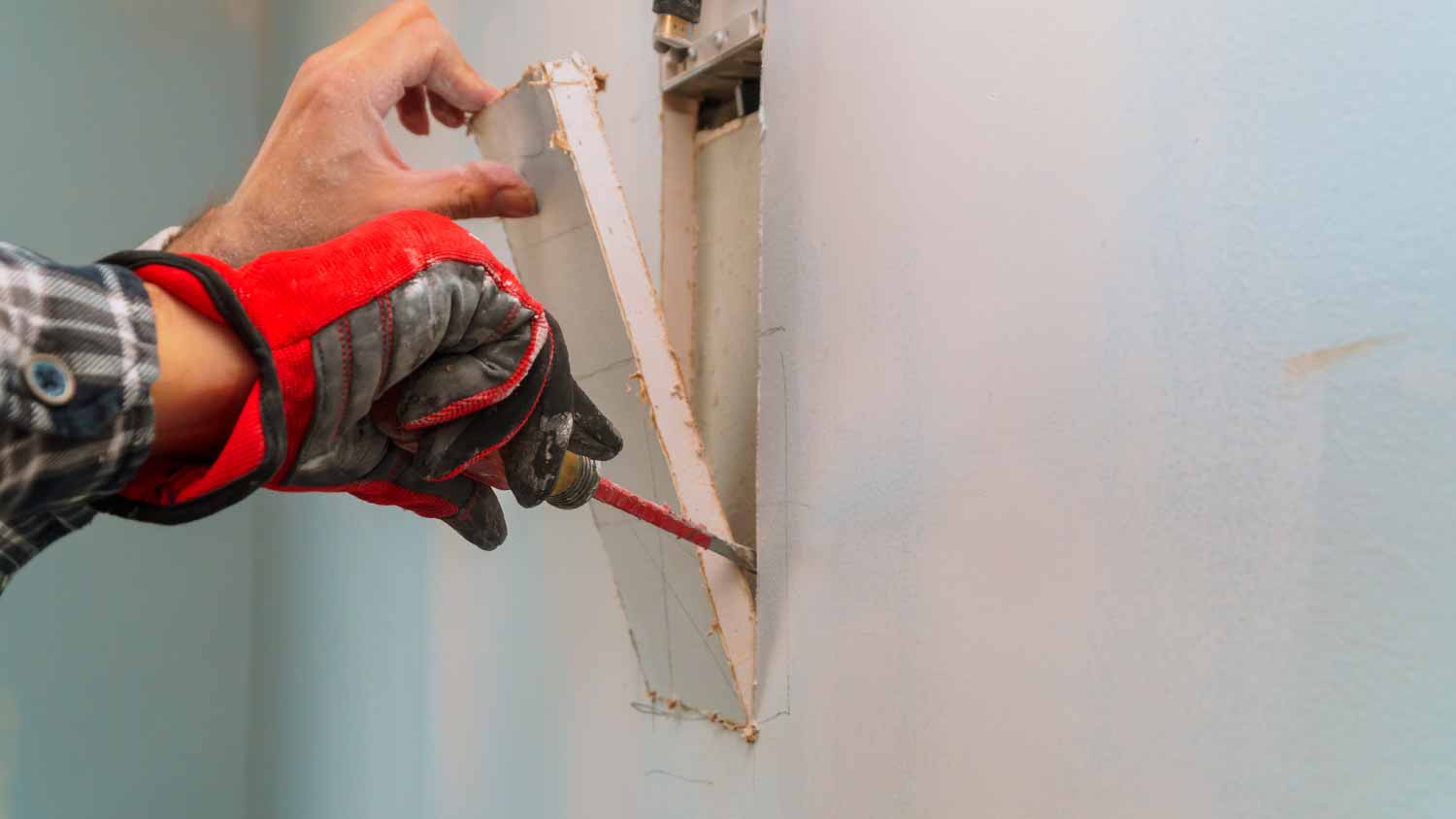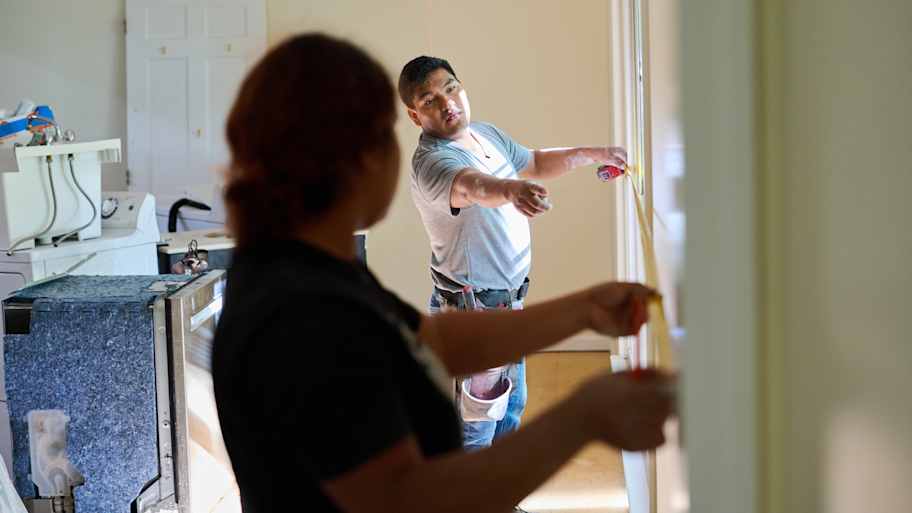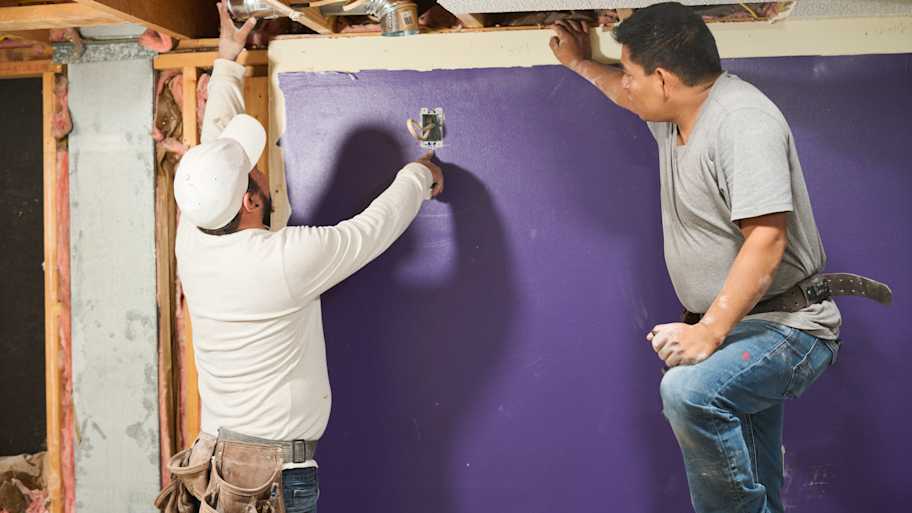Who Should You Call for Drywall Repairs?
Bring in the pros for bigger fixes


Are your walls looking worse for the wear? Chips, dents, cracks, nail pops, and holes in your drywall happen—whether it’s from natural settlement or accidental impact. Who you should call for drywall repairs depends on the severity of the problem, but a drywall repair pro is often the most qualified person for the job. This drywall contractor hiring guide will help you know who to call for drywall repair.
Benefits of Hiring a Drywall Contractor for Drywall Repairs
There are a couple of professionals who can handle minor drywall repairs, but there are major benefits to hiring someone who specializes in drywall. This is especially the case if you have textured walls or more significant repairs. The benefits include:
Less mess: Some have dustless repair techniques, which makes the process less disruptive.
Expertise: A qualified pro has the expertise to handle the most difficult repairs, including ceiling repairs, popcorn ceiling removal, and water damage remediation.
Understand the warning signs: Certain types of drywall cracks can signal subsidence, foundation movement, and other structural issues. A drywall contractor can help you understand which issues may require more serious repairs
Warranty or guarantee: Contractors often provide a warranty or guarantee. If their work doesn’t hold up, you won’t have to pay twice for them to fix it.
Can I DIY Drywall Repairs?

Most homeowners can DIY small drywall repairs—like patching a small hole in drywall or filling in small cracks. You can purchase a kit at your local hardware store. That said, you may not be able to get a seamless finish, but some homeowners don’t mind if the repair is small enough and they can hide it behind a picture frame or furniture. If you’re a renter, a small repair may be all it takes to get your security deposit back.
For larger repairs, it’s best to bring in a local drywall contractor. Drywall repair is a special skill that requires certain techniques and practice. Certain repairs are difficult, and there are some instances where you’ll definitely want to hire a drywall pro instead of DIY:
Water damage repair: Excess moisture can harbor mold and mildew.
Ceiling repairs: Repairs are challenging because you’re working against gravity.
Popcorn ceiling repair: If you have an older home with popcorn ceilings, it could harbor asbestos.
Repair to textured drywalls: Matching texture on drywall requires special techniques.
Sudden or significant cracks: The sudden appearance of multiple cracks or particularly large cracks could signal a structural issue.
Issues with electrical wiring: Significant damage to drywall can sometimes impact the wiring within the wall.
Large holes: Large holes pose a risk because pets and children can access the inside of the wall. Some homeowners DIY a patch, but it may be difficult to get a seamless look.
Drywall and plaster work require extensive practice and talent. You can try a DIY repair if a patch is small enough or where you won’t mind looking at a less-than-professional job when it’s done. If an entire wall needs repair, trust the pros to do the work so you're happy with the results.
Can I Hire an Interior Painter for Drywall Repairs?
Most interior painters do prep the wall by making minor drywall repairs before priming and painting. They’ll be able to fill minor cracks and patch small dents or holes, but they are not often drywall specialists. For larger repairs, you’ll need to consult a professional drywall contractor near you.
If your wall needs minor repairs before painting, make sure you hire a local painter with drywall repair experience. Not every painter is qualified.
How Do Drywall Contractors Repair Drywall
When you hire a drywall contractor, they’ll come to your home to assess the damage. During that time, they’ll create a plan for the repairs and give you an estimate. Damage in less accessible areas (like your ceiling or near the top of tall walls) may cost more to fix.
How they repair your wall depends on the type of damage. Their work could include filling cracks with spackle, taping cracks, covering the repaired area with joint compound, sanding, and touching up the paint. For more serious repairs, they may have to remove the damaged drywall and install new drywall. They may also skim coat the wall to hide repairs.
When your contractor finishes the repair, they’ll clean up the area.
How Much Does Drywall Repair Cost?
Drywall repair costs homeowners like you $600 on average. Prices can exceed $1,000 if the damage is severe (i.e., you have more than 20 square feet of drywall that needs repair or replacement). Drywall contractors charge $90 per hour on average.





- When Should You Hire a Pro for Drywall Repair vs. DIY?
- Who Installs Drywall? Get the Right Pro for the Job
- How to Dispose of Drywall When You’re Done With a DIY
- 5 Types of Drywall and the Use Cases for Each One
- Everything You Need to Know About Drywall Thickness and Size Options
- How to Repair Water-Damaged Drywall
- Tools for Drywall: A Complete List for DIYers
- What Is Drywall Made Of?
- Drywall Fire Ratings: Is It All Fire-Resistant? Here’s What to Know
- Should You Glue Drywall? Learn the Pros and Cons of Drywall Adhesive















